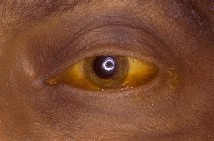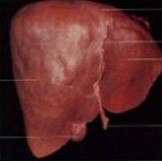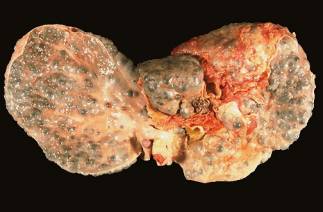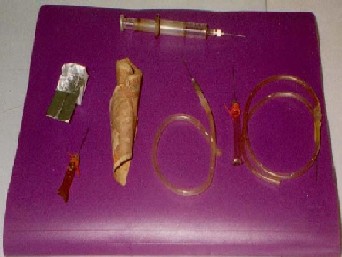|
Why is hepatitis C important ?

Hepatitis C is numerically incredibly important, in both world-wide and UK terms. As yet there is no vaccine, and there are at least six sub-groups of the virus spread all around the world.
Acquiring the virus can lead to ill health and even premature death, and yet much can be done to help infected people if it is diagnosed early. Counselling, healthcare advice, vaccination, psychological and social support, and treatment all have an important part to play.
Acute hepatitis C

Acute hepatitis C, in which the newly-infected patient becomes jaundiced (see the yellow colour of the patient's eye above), is rare. Perhaps less than 20% of people who get the virus into their body develop jaundice and those who do usually feel better quite quickly. It appears that most, if not all, people in whom the hepatitis C virus is able to enter the bloodstream, manufacture "antibodies" to hepatitis C (antibodies are a type of "fingerprint" made by the human body that tells us that the virus has been there, although it does not mean that it is STILL there).
|
A normal liver

About 85 to 90% of people who get the hepatitis C virus into their bodies will go on to develop chronic liver problems over the following years. These people have a positive hepatitis C PCR (RNA) blood test result. In the remaining 10 to 15%, the virus may not be able to establish itself and dies out (the PCR test is negative although the antibody test is positive), although some experts think that the virus is present in all people who have a positive antibody test for hepatitis C.
|
Chronic hepatitis C and cirrhosis

Over the following years, hepatitis C virus infection in the liver leads to inflammation, cell death and fibrosis (scarring). A liver biopsy will tell the doctor and the patient much about the state of the liver. After many years, liver cirrhosis (very advanced scarring) can develop. If a person catches hepatitis B and/or hepatitis D when they already have hepatitis C, this can cause make the liver situation worse over the long term. Hepatitis B and D are caught through unsafe injecting and sexual practices. In addition, hepatitis A (a virus you catch from eating food contaminated with the virus) super-infection can probably cause acute problems in people already infected with hepatitis C, so avoiding this is probably a good idea as well ! Fortunately, A, B and D hepatitis viruses can be prevented by vaccinating against hepatitis B and A, and there is an excellent combined vaccine against both A & B licensed and available in the UK at the time of writing.
|
|
Hepatocarcinoma

In some people with advanced liver disease such as cirrhosis, some liver cells may under "malignant transformation" and give rise to a cancer called "primary hepatocarcinoma". This is a very serious health condition indeed and can lead to death. Drug treatment is available for hepatitis C (see later), but liver transplantation may be the only hope for some people with advanced hepatitis C disease (such as cirrhosis and hepatocarcinoma).
|
Recreational Injecting

The importance of unsafe drug injecting and the sharing of paraphernalia cannot be overestimated when it comes to hepatitis C. The risk of transmission through a needlestick injury appears to be about 1 in 50 (2%). Other routes of transmission of the virus include contaminated blood and blood products, donated organs and tissues from infected people, and vertical transmission (from mother to baby). Transmission through sexual intercourse and other sexual activities also appears to occur, although there is much disagreement about how easily the virus spreads through the sexual route (this photograph is the property of Professor G Stimson).
|
Counselling, psychological, & social issues

Similar to the situation with HIV, having hepatitis C can carry a stigma for sufferers. Learning that one is infected with hepatitis C, particularly if the way the diagnosis is arrived at is handled badly, can be devastating for a person. The 2000 NICE Report (see links section) recommends that there should be expert pre- and post-test counselling for hepatitis C diagnosis. After this, patients will need on-going support - issues and concerns may need to re-visited, and patients will need to be advised how to minimise the risk of their infection being passed on to other people and helped with this. It is certainly helpful to minimise alcohol intake (or even become tee-total) and being vaccinated against hepatitis B (and probably also against hepatitis A) is also helpful. Avoiding catching other blood borne (or sexually transmitted) agents such as HIV is certainly very important, so safer sex advice is mandatory. If patients go onto drug treatment for the hepatitis C virus (currently with interferon and ribavirin), this can be a difficult time for them and expert on-going healthcare and social work input and support will be essential.
|
|

The 'Action on Hepatitis C' logo
|
|